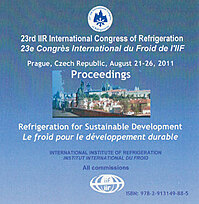
Document IIF
Prévision du transfert de chaleur lors de l'ébullition en écoulement à l'intérieur de tubes hélicoïdaux grâce aux réseaux neuronaux.
Prediction of flow boiling heat transfer in helically coiled tubes using neural network.
Numéro : pap. ID: 849
Auteurs : ELSAYED A., DADAH R. K. al-, MAHMOUD S., et al.
Résumé
Flow boiling through helical coils is an effective heat transfer enhancement technique where the centripetal force distributes the liquid film on the wall resulting in thinner liquid film and higher critical heat flux. Although there are several empirical correlations in the literature, most of these correlations are applicable for specific operating conditions. Recently, Artificial Neural Networks (ANNs) technique has been used for performance prediction in various thermal engineering topics. This paper presents the application of feed forward neural network with Levenberg-Marquardt training algorithm to predict the heat transfer coefficients of flow boiling inside 2.8mm diameter helically coiled tube. The Normalized Prandtl, Dean, Convective and Boiling numbers were utilized as network input while the two-phase to liquid only heat transfer coefficients ratio was used as output. This network was trained using 353 data points from published literature and validated with data from current experimental measurements with deviation of ± 30%.
Documents disponibles
Format PDF
Pages : 8 p.
Disponible
Prix public
20 €
Prix membre*
Gratuit
* meilleur tarif applicable selon le type d'adhésion (voir le détail des avantages des adhésions individuelles et collectives)
Détails
- Titre original : Prediction of flow boiling heat transfer in helically coiled tubes using neural network.
- Identifiant de la fiche : 30001839
- Langues : Anglais
- Source : Proceedings of the 23rd IIR International Congress of Refrigeration: Prague, Czech Republic, August 21-26, 2011. Overarching theme: Refrigeration for Sustainable Development.
- Date d'édition : 21/08/2011
Liens
Voir d'autres communications du même compte rendu (569)
Voir le compte rendu de la conférence
-
Correlation for the flow boiling heat transfer ...
- Auteurs : MIYATA K., MORI H., HAMAMOTO Y.
- Date : 21/08/2011
- Langues : Anglais
- Source : Proceedings of the 23rd IIR International Congress of Refrigeration: Prague, Czech Republic, August 21-26, 2011. Overarching theme: Refrigeration for Sustainable Development.
- Formats : PDF
Voir la fiche
-
Model for prediction of flow boiling heat trans...
- Auteurs : LI M., DANG C., TANAKA S., et al.
- Date : 07/06/2010
- Langues : Anglais
- Source : ACRA2010. Asian conference on refrigeration and air conditioning: Tokyo, Japan, June 7-9, 2010.
- Formats : PDF
Voir la fiche
-
Development of general correlation for heat tra...
- Auteurs : INOUE N., GOTO M.
- Date : 07/06/2010
- Langues : Anglais
- Source : ACRA2010. Asian conference on refrigeration and air conditioning: Tokyo, Japan, June 7-9, 2010.
- Formats : PDF
Voir la fiche
-
Heat transfer characteristics of R-134a inside ...
- Auteurs : SOLANKI A. K., KUMAR R.
- Date : 24/08/2019
- Langues : Anglais
- Source : Proceedings of the 25th IIR International Congress of Refrigeration: Montréal , Canada, August 24-30, 2019.
- Formats : PDF
Voir la fiche
-
Flow boiling of R1234yf in a 1 mm diameter chan...
- Auteurs : DEL COL D., BORTOLIN S., TORRESIN D., et al.
- Date : 21/08/2011
- Langues : Anglais
- Source : Proceedings of the 23rd IIR International Congress of Refrigeration: Prague, Czech Republic, August 21-26, 2011. Overarching theme: Refrigeration for Sustainable Development.
- Formats : PDF
Voir la fiche
